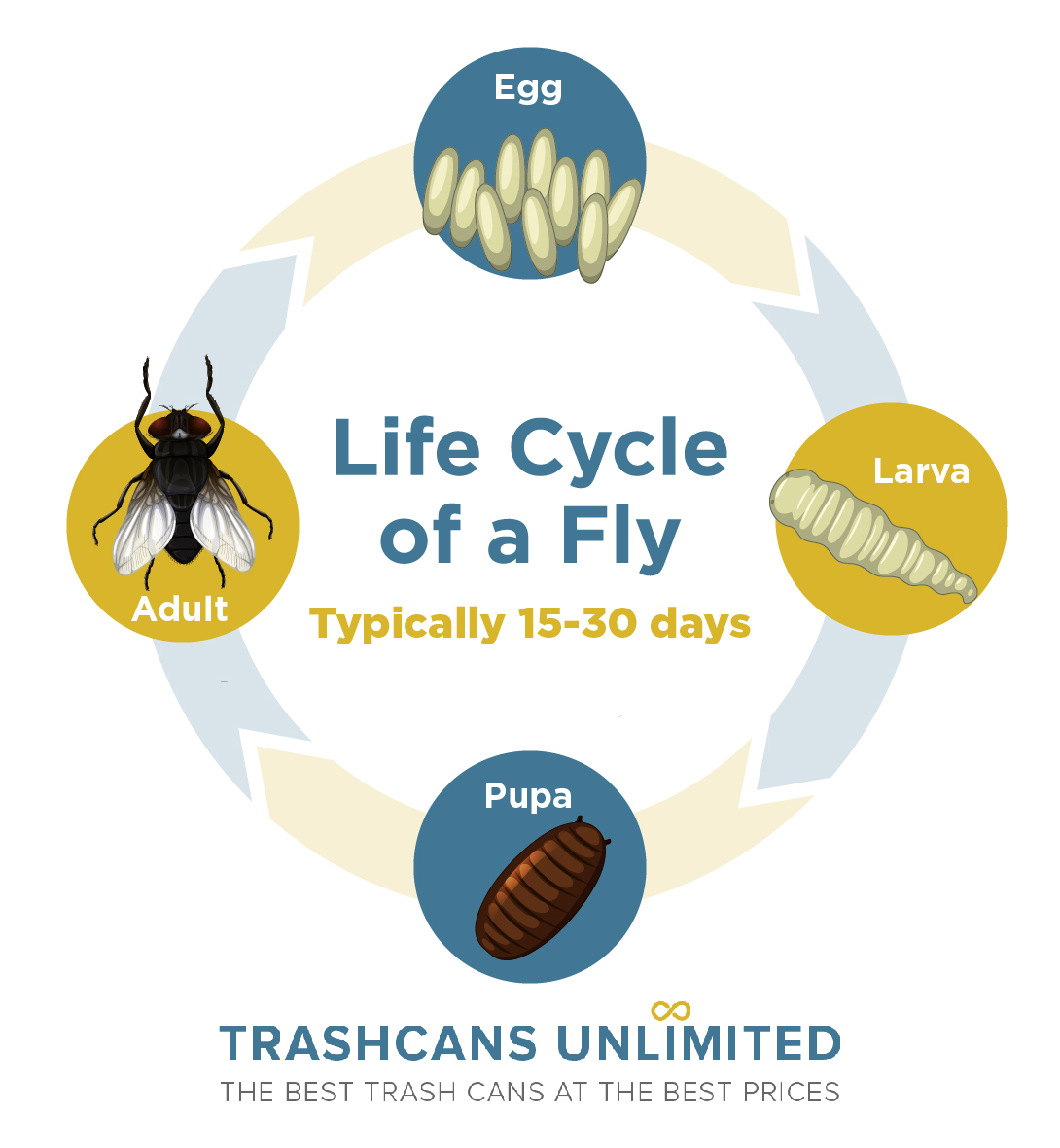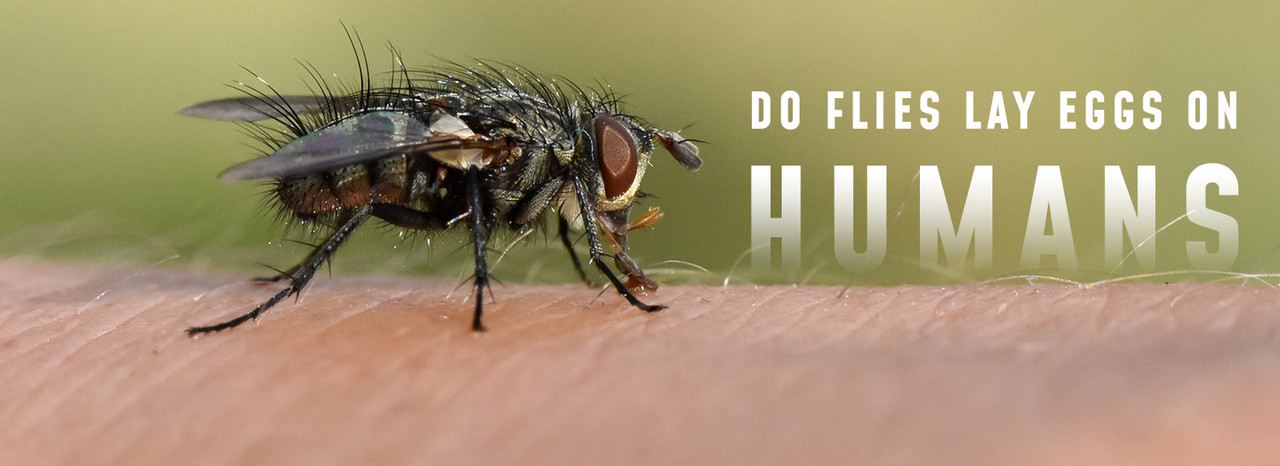Have you ever wondered if flies can lay eggs on humans? There are many rumors and myths about these pesky insects and their potential impact on our health.
Let’s get into the facts about flies and their reproductive habits, dispel misconceptions, and explore ways to protect ourselves from their presence.
Understanding Flies and Their Reproductive Habits
Flies are a common insect found in most regions of the world. They are part of the order Diptera and have two wings.
They reproduce through a process called oviposition, where the female lays eggs on or near a food source. The eggs hatch into larvae, which then transform into pupae before emerging as adult flies.
While flies may seem like a nuisance, they play an important role in the ecosystem. They serve as pollinators for some plants and are an important food source for many animals. But, how long do they live?
The 4 Steps of The Life Cycle of a Fly
The life cycle of a fly consists of four stages:

The time it takes to complete the cycle varies depending on the species and environmental factors such as temperature and humidity. But it’s normally just a few days.
Female flies can lay up to 900 eggs during their lifetime, and they prefer to deposit them on decaying organic matter such as animal waste, garbage, and fruit. The eggs hatch into larvae, which feed on the organic matter before transforming into pupae. The pupae then develop into adult flies, ready to start the cycle anew.
It is important to note that flies can reproduce rapidly, and a small infestation can quickly become a larger problem if not addressed.
The 5 Most Common Types of Flies and Their Behaviors
There are many different species of flies, but some of the most common types include:
- House flies, which are attracted to human and animal waste and can carry harmful bacteria like salmonella and E. coli.
- Fruit flies, which, as their name suggests, are drawn to ripe or fermenting fruit and can be a nuisance in kitchens and grocery stores.
- Blowflies, which are attracted to dead animals and can be an indicator of a larger pest problem.
- Horse flies and deer flies, which are known for their painful bites.
- And stable flies, which feed on the blood of livestock and can cause irritation and decreased productivity.
Flies in general are attracted to moist environments and organic matter. They can transmit diseases to humans and animals when they come into contact with contaminated surfaces or objects.
It is important to take steps to prevent infestations and keep your living spaces clean and dry to avoid these problems from ever stepping on your doorstep!
Ideal Breeding Environments for Flies
Flies require warm and moist conditions to breed, and their ideal environments include areas such as garbage cans, animal pens, and compost piles. They can also lay eggs on food left out in the open, particularly fruits and vegetables.
This is why it is so important to keep your living space and surrounding areas clean and dry. This can be achieved by:
- Properly disposing of waste
- Cleaning up spills and crumbs
- Using screens or netting to keep flies out.
- And regularly cleaning and maintaining areas where flies are likely to breed can also help prevent infestations.
By understanding the habits and behaviors of flies, we can take steps to prevent infestations and keep our living spaces clean and healthy.
Debunking 3 Myths About Flies and Humans
Flies are a common sight in our daily lives, and it is no surprise that many myths and misconceptions have arisen about their relationship with humans. It’s time to debunk some of these myths and provide you with the facts about flies and their interactions with humans.
1. The Truth About Flies and Disease Transmission
It is a well-known fact that certain species of flies can transmit diseases to humans and animals. However, it is important to note that the relationship between flies and disease transmission is not always as straightforward as it seems.
For example, house flies are often associated with disease transmission, as they can carry bacteria like salmonella and E. coli. However, it is important to note that house flies do not actively seek out human hosts. Instead, they are attracted to areas where waste and decaying organic matter are present, which can include things like garbage, animal feces, and compost piles.
2. Can Flies Lay Eggs on Human Skin?
One common myth about flies is that they can lay eggs on human skin. However, this is not true. The skin is too thick and does not provide a suitable environment for fly eggs to hatch.
That being said, flies can lay eggs on open wounds or sores. This can lead to infection if the wound is not properly cleaned and treated.
It is important to keep any wounds or sores clean and covered to prevent flies from laying eggs on them!
3. Flies and Human Interaction: What's the Real Story?
While flies do not actively seek out humans as hosts, they can still be a nuisance in our environments. Flies are attracted to food and moisture, and can quickly become a problem if left unchecked.
One way to prevent flies from becoming a problem is to keep your living spaces clean and free of food debris. This includes:
- Wiping down counters
- Sweeping floors
- And taking out the trash regularly.
It is also important to note that some individuals may have an allergic reaction to fly bites or exposure. This can cause symptoms like swelling and itching. However, these reactions are rare and usually not a cause for serious concern.
Flies are a common sight in our daily lives, and it is important to separate fact from fiction when it comes to their interactions with humans. While flies can transmit diseases and be a nuisance in our environments, there are steps we can take to prevent them from becoming a problem.
Instances of Flies Laying Eggs on Humans
While it is not common for flies to lay eggs on humans, there have been documented cases of this occurring. Let us take a closer look at some of these instances and the factors that contributed to them.
Case Studies and Documented Occurrences
In a study conducted by the University of Florida, researchers found that certain species of flies are attracted to the odors and secretions produced by open wounds and sores. This can lead to the deposition of eggs on the affected area, which can then hatch into larvae and cause further damage.
Another documented occurrence of flies laying eggs on humans was reported in the Journal of Medical Entomology. The report described a case where a patient with a skin condition was infested with fly larvae after being exposed to an area with a high fly population. The larvae caused significant damage to the patient's skin and required medical intervention.
The 3 Factors That Contribute to Fly Infestations on Humans
Some of the factors that can contribute to fly infestations on humans include:
- Poor hygiene
- Living in areas with high fly populations
- And having open wounds or sores.
In addition, individuals who work in certain industries, such as animal or waste management, may be more exposed to flies in their daily lives. It is also worth noting that certain species of flies are more likely to lay eggs on humans than others.
The green bottle fly, for example, is known to be attracted to open wounds and can quickly lay eggs on the affected area. So, learn to identify the common species and just keep and eye out for any possible infestations near you.
Preventing and Treating Fly-Related Health Issues
Prevention is the key to avoiding fly-related health issues. This can be achieved by practicing good hygiene habits, properly storing and disposing of waste, and keeping living spaces clean and dry.
If you do find yourself with a fly infestation or other related health issue, there are various treatments available ranging from over-the-counter medications to medical intervention. It is important to seek professional help if you suspect a serious problem.
Some home remedies that may help alleviate the symptoms of fly infestations include applying petroleum jelly or tea tree oil to affected areas. These substances can suffocate the larvae and prevent them from causing further damage.
In severe cases, surgery may be necessary to remove the larvae and repair the damaged tissue. This is typically only required in cases where the infestation has gone untreated for an extended period of time.
Keep The Flies Away!
While it is not common for flies to lay eggs on humans, they can still be a nuisance and potential health hazard in our environments. By understanding their reproductive habits, dispelling myths, and practicing prevention methods, we can protect ourselves and our surroundings from their presence.
It is important to take any potential fly-related health issues seriously and seek professional help if necessary. With proper care and attention, we can keep our living spaces and bodies free from the pests that would seek to invade them.

